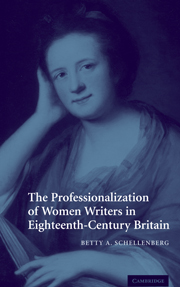Book contents
- Frontmatter
- Contents
- Acknowledgments
- A note on citations
- Introduction: “building on public approbation”
- 1 Frances Sheridan, John Home, and public virtue
- 2 The politicized pastoral of Frances Brooke
- 3 Sarah Scott, historian, in the republic of letters
- 4 The (female) literary careers of Sarah Fielding and Charlotte Lennox
- 5 Harmless mediocrity: Edward Kimber and the Minifie sisters
- 6 From propensity to profession in the early career of Frances Burney
- 7 Women writers and “the Great Forgetting”
- Coda
- Notes
- Bibliography
- Index
2 - The politicized pastoral of Frances Brooke
Published online by Cambridge University Press: 12 November 2009
- Frontmatter
- Contents
- Acknowledgments
- A note on citations
- Introduction: “building on public approbation”
- 1 Frances Sheridan, John Home, and public virtue
- 2 The politicized pastoral of Frances Brooke
- 3 Sarah Scott, historian, in the republic of letters
- 4 The (female) literary careers of Sarah Fielding and Charlotte Lennox
- 5 Harmless mediocrity: Edward Kimber and the Minifie sisters
- 6 From propensity to profession in the early career of Frances Burney
- 7 Women writers and “the Great Forgetting”
- Coda
- Notes
- Bibliography
- Index
Summary
But whither am I wandering? I am got, without knowing how, into politics, a subject of all others the least agreeable either to my sex or to my disposition.
(The Old Maid 31 [June 12, 1756])I understand Mrs. Brooke has been a Devilish instrument against you, but has done no harm, and is blown up.
(Patrick Murray, Lord Elibank, to General James Murray, March 24, 1765)A comparative examination of eighteenth-century women writers and their texts clearly shows wide variations in the degree to which these writers envisioned themselves as what H. T. Dickinson calls “political agents.” Once we have moved beyond an oversimplified notion of mid-century women as restricted to a domestic, or private, sphere of action distinct from the public spheres of politics and letters, we can begin to see some variations in agency represented in records of professional lives, in paratextual statements, or in actual publications. Some writers clearly saw their publications, pace Habermas, participating in a public sphere that was overtly political, and not merely literary. Whereas I will argue in my third chapter that Sarah Scott intervened in a self-conscious but deliberately disembodied and fragmented sense in a republic of letters, focusing in her historical biographies on the social responsibilities of the “private” gentleman of property, I have shown that Frances Sheridan more explicitly connects Sidney Bidulph's story with the public genre of tragedy in the politically resonant form of John Home's Douglas.
- Type
- Chapter
- Information
- Publisher: Cambridge University PressPrint publication year: 2005



